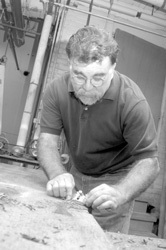
Staples Cabinet Makers
Owners: Steve and Chris Staples
Location: Plainville, Mass.
Type of Business: Furniture makers
Year Founded: 1973
Employees: Five
Annual Sales: WND
Steve and Chris Staples have seen the highs and lows of running their business since they first began turning a hobby into a profitable venture more than 30 years ago.
They once dabbled almost solely in antique reproductions, before shifting to mill restoration work in the 1980s and then nearly losing everything in the recession of the early 1990s. The latest incarnation of Staples Cabinet Makers specializes in reclaiming wood from old houses and barns throughout New England and giving new life to lumber that would otherwise be destined for a landfill.
The childhood sweethearts divvy up the business responsibilities, with Steve handling the artistry and Chris running the business end.
Steve said much of what he turns out is furniture created with old pine floorboards, though he will occasionally work with reclaimed chestnut and oak. The couple said farm tables continue to be the bread and butter of the latest incarnation of the business, with floorboards being fitted together as a tabletop and roof beams often transformed into table legs.
Another big seller are cupboards built around antique doors, which customers buy and use as hutches, bookshelves or entertainment centers. Hardware is often recycled from the lots of wood the business buys in bulk to supply a piece’s hinges or knobs. Sturdy new shelves and drawers with dovetailed joints are often part of a completed piece.
After spending two years as a merchant seaman in the 1970s, Steve returned to Massachusetts and opened the business’s original location in Norton with Chris. The couple had refinished antiques for their home and began handling work for customers out of their home. Later, the couple tackled mostly architectural millwork, doing specialized subcontracting work on projects, often handling custom moldings and windows that can still be seen throughout Boston, including in North Station and Boston University buildings.
But the couple lost nearly everything in the recession of the early 1990s. Companies that had been farming work out to the Staples, pulled their millwork back in-house and the Staples found themselves without a reliable customer base. They sold off most of their equipment, with Steve doing restoration work out of their home and Chris briefly returning to corporate America.
“We lost the business, but we were lucky enough to save the marriage,” Chris said. “A lot of people can’t say that.”
In 1997, they decided to try it all again, renting about 400 square feet of space in Plainville, Mass., and slowly accumulating equipment for a full workshop. Now, the business’s latest incarnation occupies nearly three times the space – with about one-third of the area dedicated to a showroom.
Business has about doubled each year and Steve now turns out new furniture with a trio of workers, occasionally bringing on a fourth craftsman when work demands it. Chris handles the business’s bottom line, juggling paperwork while running the front end of the store, along with Steve’s mother, who is an indispensable, if unofficial, part of the staff.
“You can’t just have anybody doing this work,” Steve said. “You need people who are talented and who share your vision for what a job well done is.”
Chris says after 30 years in business, many of the couple’s customers from decades ago have found Staples Cabinet Makers again. She advertises in the Boston Globe magazine as well as a few other Massachusetts papers, but notes the business nowadays is targeting an affluent customer base that won’t balk at paying upward of $1,500 for a kitchen table.
And the Internet has become a big part of selling the product. The couple’s son helps by posting digital images of new pieces rolling out of the workshop and now has a site on eBay. Chris said they receive inquiries from all over and have shipped pieces to customers on the West Coast and the southern part of the country.
“We didn’t have the Internet the last time we did this,” Chris said. “Now, we still have a way to reach customers in other parts of the country if there’s a downturn here.”
Steve brings in new pieces each week, buying wood from dealers who’ll go into a building and hire workers to rip out salvageable pieces. The reclaimed lumber business has its own set of standards and lingo, which Steve has had to master over the years. He doesn’t scour the region as often as he’d like for lumber, but has a solid network of contacts who’ll call offering him wood described as things like attic (no nails), well-walked (worn floorboards), green bin pine (oily from storage of oats and feed) or roofers (that has a lot of nails).
The business brings in a couple thousand feet of lumber per month and stores a good amount of the stock in a separate barn at the rear of the building.
He still does custom work for people incorporating a range of pieces into furniture. Within recent months, he’s sliced the remains of a dead standing ash tree into table tops, found rare ironwood in the supports of a home originally built in the 1700s and worked to incorporate molds from a Cumberland mill into his designs.
“I’m making a gamble every morning I get up and start working on something,” Steve said. “I lay in bed at night, building pieces in my mind and work through it the next day. … The trick of it is finding those customers who share that vision and see the potential in a piece.”












